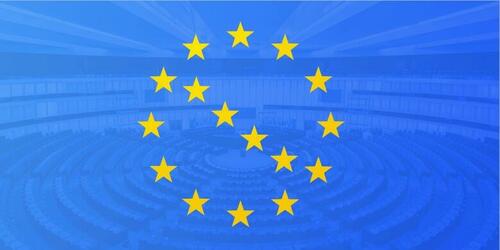And just to corroborate our previous post from Pr Jacob Nordangård, Here's the directives from the EU on mis- and dis- information. Almost a carbon copy of the WEF and UN information control agenda.
Great democrats these people!
“War is peace.
Freedom is slavery.
Ignorance is strength.”
―
1984
Authored by Nick Corbishley via NakedCapitalism.com,
This is the culmination of a process that began at least a decade ago.
One of the most important (albeit least reported) developments of 2023 was the launch of the European Union’s Digital Services Act (DSA), which came into full effect in late August and which we covered in the article, The EU’s Mass Censorship Regime Is Almost Fully Operational. Will It Go Global? The goal of the DSA is to combat — i.e., suppress — mis- and disinformation online, not just in Europe but potentially across the world and is part of a broader trend of Western governments actively pushing to censor information on the Internet as they gradually lose control over the narrative.
Here’s how it works: so-called Very Large Online Platforms (VLOPs) and Search Engines (VLSEs) — those with more than 45 million active monthly users in the EU — are required to censor content hosted on their platforms deemed to be illegal by removing it, blocking it, or providing certain information to the authorities concerned. Platforms are also required to tackle hate speech, dis- or misinformation if it is deemed to have “actual or foreseeable negative effects on civic discourse and electoral processes, and public security” and/or “actual or foreseeable negative effects in relation to gender-based violence, the protection of public health and minors and serious negative consequences to the person’s physical and mental well-being.”
Besides take-downs and outright suspensions, other familiar tools at the disposal of tech platforms include de-monetisation, content demotion, shadow-banning and account visibility filtering. The European Commission has primary, but not exclusive, regulatory responsibility for VLOPs and VLOSEs. The same requirements now also apply to all other online service providers, though responsibility for execution and enforcement lies not with the Commission but national authorities.
Staying Mum
So far, the platforms, including even Elon Musk’s X, appear to be adhering to the EU’s rules on disinformation. If they weren’t, they could face serious economic consequences, including fines of up to 6% of global turnover, as well as the looming threat of warrantless inspections of company premises. The X platform (formerly known as Twitter) may have left the EU’s voluntary code of practice last summer and in December was hit with a probe over disinformation related to Hamas’s October 7 attack, but its actions — or rather lack of actions — since then suggest it is indeed complying with the rules.
As Robert Kogon reports for Brownstone Institute, (granted, not the most popular source of information on NC, but this is another solid, well researched piece by Kogon on a topic virtually no one else is talking about), “while Musk and the Twitter Files are so verbose about alleged ‘US government censorship,'” they “have remained suitably mum about EU censorship demands”:
[I]t is strictly impossible that Twitter has not had and is not continuing to have contact – indeed extensive and regular contact – with EU officials about censoring content and accounts that the European Commission deems “mis-” or “disinformation.” But we have heard absolutely nothing about this in the “Twitter Files.”
Why? The answer is: because EU censorship really is government censorship, i.e. censorship that Twitter is required to carry out on pain of sanction. This is the difference between the EU censorship and what Elon Musk himself has denounced as “US government censorship.” The latter has amounted to nudges and requests, but was never obligatory and could never be obligatory, thanks to the First Amendment and the fact that there has never been any enforcement mechanism. Any law creating such an enforcement mechanism would be obviously unconstitutional. Hence, Twitter could always simply say no…
Far from any sign of defiance of the Code and the DSA, what we get from Elon Musk is repeated pledges of fealty: like the below tweet that he posted after meeting with EU Internal Market Commissioner Thierry Breton in January. (For an earlier such pledge in the form of a joint video message with Breton, see here.)
Now, the European Commission has its sights set on the EU’s parliamentary elections, to be held in June. “Integrity of election[s] is one of my top priorities for DSA enforcement, as we are entering a period of elections in Europe,” Breton the Enforcer told Politico last September.
Elections in Slovakia in September were supposed to offer a dummy run, but the results were underwhelming, at least as far as the Commission was concerned. The left-wing populist and social conservative party, Direction–Social Democracy (Smer-SD), led by former Prime Minister Robert Fico, took the largest number of votes and was able to form a coalition government with like-minded parties. Fico had promised to cut all aid to Ukraine, which he says is governed by neo-Nazis, as well as block its ascension to NATO.
The Commission is determined to up its game, however. Last week, it published a set of guidelines for Big Tech firms to help Brussels “secure” the upcoming elections from foreign interference and other threats. The guidelines recommend “mitigation measures and best practices to be undertaken by Very Large Online Platforms and Search Engines before, during, and after electoral events,” and are explained as necessary in order to prevent things like fake news, turnout suppression, cyber threats and attacks, and, of course, Russia’s malign influence on European public opinion, particularly regarding Ukraine.
“In the European Union we speak about the Kremlin, which is very successful in creating narratives which can influence the voting preferences of the people,” said EU Vice-President for Values and Transparency, Věra Jourová, in a recent interview with the Atlantic Council, a neocon think tank that knows a thing or two about disinformation having played a leading role in the ProporNot fiasco that baselessly outed hundreds of alternative news websites as Russian propagandists including this one. “And lying, just lies… Disinformation in order to influence elections in a way that the people in Europe will stop to support (sic) Ukraine.”
List of Demands
Here is, word for word, the full list of the EU’s demands for the platforms, interspersed with a few observations and speculations of my own (italicised and in brackets). The platforms are instructed to:
“Reinforce their internal processes, including by setting up internal teams with adequate resources, using available analysis and information on local context-specific risks and on the use of their services by users to search and obtain information before, during and after elections, to improve their mitigation measures.”
(This may sound eerily familiar to the US government’s censorship efforts revealed by the Twitter files, but there is a key difference: the processes in the US were largely covert and informal, with nothing in the way of legal consequences in the case of non-compliance. By contrast, the EU’s DSA ensures that the processes are not just overt and legally authorised, they are backed up with the very real threat of substantial economic sanctions).
“Implement elections-specific risk mitigation measures tailored to each individual electoral period and local context. Among the mitigation measures included in the guidelines, Very Large Online Platforms and Search Engines should promote official information on electoral processes, implement media literacy initiatives, and adapt their recommender systems to empower users and reduce the monetisation and virality of content that threatens the integrity of electoral processes. Moreover, political advertising should be clearly labelled as such, in anticipation of the new regulation on the transparency and targeting of political advertising.”
(The first sentence serves as a reminder that these processes will be applied not only to EU elections. As the Commission’s announcement on X makes clear, it also plans to “protect the integrity” of 17 national or local elections across Europe this year. What about elections in other regions of the world? For example, the US’ general election in November, on which so much rests, including quite possibly the future of NATO. Clearly, the European Commission and the national governments of many EU member states have a vested interest in trying to prevent another Trump triumph).
“Adopt specific mitigation measures linked to generative AI: Very Large Online Platforms and Search Engines whose services could be used to create and/or disseminate generative AI content should assess and mitigate specific risks linked to AI, for example by clearly labelling content generated by AI (such as deepfakes), adapting their terms and conditions accordingly and enforcing them adequately.”
(The EU has just passed its AI Act, one of whose ostensible purposes is to tackle the threat posed by AI-generated videos and other recordings. As high-quality deep fakes are becoming harder to desire, this is a growing challenge. For the moment, the Commission is relying on the DSA to address these risks for the upcoming EU elections).
“Cooperate with EU level and national authorities, independent experts, and civil society organisations to foster an efficient exchange of information before, during and after the election and facilitate the use of adequate mitigation measures, including in the areas of Foreign Information Manipulation and Interference (FIMI), disinformation and cybersecurity.”
(As readers no doubt appreciate, this level of collusion between government and big tech platforms — the ultimate public-private partnership — aimed at controlling the message throughout an election period, is exceedingly dangerous. Even the EFF, which has praised many aspects of the DSA, warns that “Issues with government involvement in content moderation are pervasive and whilst trusted flaggers are not new, the DSA’s system could have a significant negative impact on the rights of users, in particular that of privacy and free speech.”)
“Adopt specific measures, including an incident response mechanism, during an electoral period to reduce the impact of incidents that could have a significant effect on the election outcome or turnout.”
“Assess the effectiveness of the measures through post-election reviews. Very Large Online Platforms and Search Engines should publish a non-confidential version of such post-election review documents, providing opportunity for public feedback on the risk mitigation measures put in place.”
(This last point feels as though it is intended to give this vast entreprise a veneer of respectability through the use of expressions such as “non-confidential” and “public feedback,” presenting the illusion that these processes will all be happening out in the open and with the direct involvement of the public, which couldn’t be further from the truth).
Not everything about the DSA is bad, however. The Electronic Frontier Foundation (EFF), for example, has praised many aspects of the regulation, including the protections it provides on user rights to privacy by prohibiting platforms from undertaking targeted advertising based on sensitive user information, such as sexual orientation or ethnicity. “More broadly, the DSA increases the transparency about the ads users see on their feeds as platforms must place a clear label on every ad, with information about the buyer of the ad and other details.” It also “reins in the powers of Big Tech” by forcing them to “comply with far-reaching obligations and responsibly tackle systemic risks and abuse on their platform.”
But the EFF says it also “gives way too much power to government agencies to flag and remove potentially illegal content and to uncover data about anonymous speakers”:
Democracies are in many ways like the internet. In both cases, it may take a thousand cuts to demolish their foundation, yet each cut contributes significantly to their erosion. One such cut exists in the Digital Services Act (DSA) in the form of drastic and overbroad government enforcement powers.
A Long Time Coming
The DSA is the culmination of a process that began at least a decade ago. Following the 2014 Maidan Square uprising, the US, NATO and the EU began attacking those who denounced it for what it was> a coup d’état. It was not long before the EU’s vast bureaucratic superstate was wheeled into place for a new propaganda war with Moscow.
At the start of 2015, Anne Applebaum (wife of the Polish ex-Minister for Defence, Radosław Sikorski, who famously thanked the US for the sabotage of the Nordstream pipelines), set up a unit within the Washington Center for European Policy Analysis called the Information Warfare Initiative. Its founding mission was to counter Russian information in Central and Eastern Europe.
Months later, the European Council tasked the EU’s then chief diplomat, Federica Mogherini, with preparing a plan of “strategic communication” to denounce the Russian disinformation campaigns relating to Ukraine. The end result was the establishment of the EEAS Strategic Communication Division, whose functions include “leading the work on addressing foreign disinformation, information manipulation and interference” as well as “analys[ing] the information environment in order to enable EU foreign policy implementation and protect its values and interests.” That was in April 2015.
After 2016, the EU took its fight against disinformation to a whole new level following the triumph of Brexit and the election of Donald Trump. In June 2018, the Commission launched its Code of Practice on Disinformation, which was “voluntarily” signed by all of the major online social media platforms and search engines. In June 2022, almost exactly four years later, the Digital Services Act became law. Just over a year after that, on August 25, 2023, the deadline by which all VLOPs and VLSEs had to begin fully complying with the DSA passed. On that date, the EU’s Code of Practice on Disinformation lost its voluntary nature.
According to Jourová, Brussels is only interested in helping to establish the “facts”, not censoring people’s “opinions”:
But who gets to decide what actually constitutes mis- or disinformation for the EU’s roughly 450 million citizens (as well as arguably untold millions of citizens far beyond Europe’s borders)?
The European Commission.
That’s right, the EU’s scandal-tarnished, power-hungry executive branch whose top jobs, including that of its current president, Ursula von der Leyen, will be indirectly determined by the upcoming EU elections. It is the 705 Members of the European Parliament chosen by EU citizens this June who will ultimately have the final say on who fills the Commission’s roles.
The performance of the current Commission and Parliament is hardly what you would describe as vote-winning. The current Commission President Von der Leyen is under investigation on multiple fronts, including by the European Public Prosecutor’s Office, for her refusal to disclose the content of her whatsapp conversation with Pfizer CEO Albert Bourla during pre-negotiations for up to 1.8 billion Pfizer-BioNtech COVID-19 vaccines. It was one of the biggest procurement contracts in EU history. VdL has also faced accusations of conflicts of interest over her husband’s role as scientific director at US biotech company Orgenesis, which received hundreds of millions of euros of EU subsidies on two separate occasions.
Von der Leyen now wants the Commission to take a central role coordinating EU weapons procurement. She even cited her office’s success in procuring COVID-19 vaccines as a model to follow. Her Commission has also provided unbridled support to Israel while the IDF commits genocidal war against the people of Gaza. It has sabotaged the EU’s economic future through its endless backfiring sanctions on Russia while consistently putting US interests first. As economic conditions have deteriorated, the response from both the EU Commission and many member governments is almost always the same, as Conor Gallagher reported recently:
More wage suppressions, more market-friendly reforms, more social spending cuts, and more privatization. It was only a few months ago that the New York-based private equity firm KKR, which includes former CIA director David Petraeus as a partner, reached a controversial agreement to buy the fixed-line network of Telecom Italia. Now the Italian daily La Repubblica is declaring that “Italy Is For Sale,” in which it describes plans for 20 billion euros worth of privatizations, including more of the state rail company Ferrovie dello Stato, Poste Italiane, Monte dei Paschi bank and energy giant Eni. The plan is reportedly necessitated by the country’s tax cuts. The roughly 100 billion euros Rome has burned through in order to address the energy crisis surely hasn’t helped either. And this was happening with the suspension of the EU debt brake.
Acceleration of a Long-Term Trend
In a recent op-ed in Berliner Zeitung, a retired German judge described the DSA as a “trojan horse that presents a façade of respecting democratic principles@ while doing the exact opposite. He concludes that the EU’s mass censorship regime poses an “existential threat” to freedom of speech and the freedom of press, which are the corner stones of any genuine liberal democracy.:
The EU Commission sets the standard by which disinformation is judged. However, this means that politically unsavoury opinions, even scientifically argued positions, can be deleted, and not only that: if it is classified as unlawful, there are social consequences.
One inevitable result is that citizens begin self-censoring to align their messages on the platforms with what is currently acceptable within the corridors of power…. The cornerstone of any free society — the perpetual exchange of intellectual and political ideas, even with opposing opinions — will therefore crumble.
This is all happening at the same time that both the Commission and some EU national governments are pushing the bloc toward direct conflict with Russia while calling for the establishment of an EU-wide war economy, all to be paid for no doubt by the EU’s hard-strapped citizens and businesses. All the while, Brussels is fast erecting its digital control system, first through the introduction of a bloc-wide digital identity program — which, like the digital vaccine passport system that preceded it, is being marketed as a purely voluntary scheme — followed some time later by a central bank digital currency.
The escalating war in Ukraine serves as a timely pretext for a brutal clampdown on basic democratic freedoms. But the EU would have probably reached this destination anyway, sooner or later. As a political project, the EU is fundamentally anti-democratic while its myriad failings have served as a convenient scapegoat to blame whenever national governments answerable to people have had to take unpopular decisions.
What Europe is now living through is an acceleration of a long-term trend, though this time the EU’s anti-democratic nature could have repercussions far beyond its own borders. Each crisis of this century has created a new opportunity for the Commission to tighten its grip while Europe itself grows weaker and weaker. As the veteran British journalist Peter Obourne once put it, “By a hideous paradox the European Union, set up as a way of avoiding a return to fascism in the post-war epoch, has since mutated into a way of avoiding democracy itself.”












